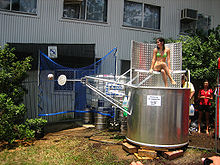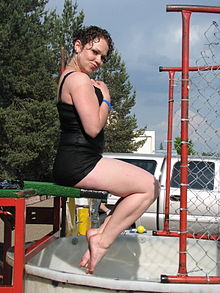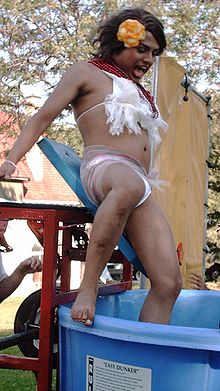- Dunk tank
-
A dunk tank, also known as a dunking booth or dunking machine, is an attraction mainly used in funfairs, fundraisers, and personal parties. Basically, a dunk tank consists of a large tank of water, over which a seat is suspended. By striking a target, the seat will tip or fall into the tank of water, thus "dunking" whoever is sitting on the seat.
Contents
Types
There are many types and brands of dunk tanks commercially available. Most consist of a plastic tank and seat, with a metal support frame. Others are made entirely of metal, and some are made of wood. Usually, there is fence-like protector around the seat, which is used to protect the person sitting on the seat from being injured by stray balls missing the target. The seat is latched in an upright position. When the target is struck, the seat becomes un-latched, thus dropping the victim into the tank.
The Easy Dunker
The Easy Dunker, manufactured by Twister Display, is likely the most common rentable dunk tank on the US market.[citation needed] It consists of a plastic tank, approximately four feet deep, and a plastic seat, around which is a plastic chassis which can be towed by a vehicle with a trailer hitch. Often there is a clear plastic window on the front of the tank so that the victim can be seen underwater. To the side of the tank is the target, a circle approximately one foot in diameter. Behind the target is a plastic tarp with a metal frame to stop balls which miss the target itself. The person to be dunked climbs onto the seat via a ladder on the side of the dunk tank, and is protected by a chain-link fence enclosure while waiting to be dunked. When the target is hit, the seat becomes disengaged from the chassis, tipping the victim into the tank. The seat-target mechanism, usually a vise grip that holds the seat in place by clamping down on a metal ring at the rear underside of the seat, and which is welded to the chassis so that the target shaft trips it when hit, must be reset afterwards, and the victim climbs back onto the seat using a molded step at the bottom rear of the tank and the chain-link enclosure and chassis for leverage.
Twister Display has since released an updated version of their dunk tank, called Easy Dunker 2. This newer model is similar in all aspects to the original, though there have been a few modifications. Whereas the original chassis had a platform flush to the seat on both sides, for the Easy Dunker 2 on one side the platform is lower, nearly flush to the top of the tank, forming a step that makes it easier to get onto the seat.
Other types
There is a smaller and shallower dunk tank, similar to the Easy Dunker. This tank works is a similar way, but is often used in events where younger children might wish to participate in getting dunked. Additionally, there are several individual dunk tank designs. Among the dozens of variations are dunk tanks in which the victim is completely enclosed by a fenced enclosure; dunk tanks in which two or more people can be dunked at the same time; and dunk tanks where the target mechanism is tripped by unusual ways (e.g., making a golf hole, shooting a free throw, etc.) There are also dunk tanks where the seat runs sideways across the tank and is supported at one side by the target shaft, for some of these particular dunk tanks the seat splits apart in the middle, as seen in the movie Roustabout and the CHiPs episode entitled Boulder Wrap Party. There are also dunk tanks where instead of a traditional seat, the victim sits on a swing, as seen on Battle of the Network Stars which aired in the late 70's and early 80's.
Events
Fundraising
Several groups use dunk tanks as fund raisers. For example, at a town or county fair a group may rent a dunk tank, and have volunteers willing to be dunked. The public could then pay a small fee for the chance to dunk them. Student groups, scouting programs, church youth groups, and other non-for-profit organizations frequently do this.
Parties, carnivals, and picnics
Dunk tanks are also frequently rented for events where people are not charged for the chance to dunk a volunteer. This is common at schools, for example, where teachers may volunteer to get dunked as a reward for students at the end of the school year. "Free" dunk tanks are also common at church picnics, block parties, birthday parties, etc. In Thailand, dunk tanks are a popular attraction at Buddhist temple fairs for a game called sao noi tok nam (สาวน้อยตกน้ำ, literally little lady falling into water). Sometimes, at college/adult parties, people, usually men, would pay the women to go into a dunk tank with nothing on except a white t-shirt and a pair of bikini bottoms, forming something similar to a wet t-shirt contest.
Nightclubs/pubs
Gunjee UK Ltd (gunjee) pionered Dunk Tanks in UK nightclubs. Normally centred on-stage as the focal point of an evening's entertainment, patrons can volunteer themselves or their friends for a soaking in the dunk tank, either for a prize or just for the fun of it.[1]
Clothing
Depending on the type of event the dunk tank is being used for, the people being dunked may opt for various different clothing options. People will often volunteer to get dunked fully clothed for a humorous effect. For example, school teachers, a boss at a company picnic, or local "celebrities" may choose to wear street clothes in the dunking booth for the added humor. Some men even go as far to wear a suit and tie and women as far as a nice crisp open collared blouse and skirt, or funny costumes in a dunk tank. Also, a group may choose to wear a special uniform while on the dunk tank. For example, youth group may wear a group T-Shirt, or a Scouting group may choose to be dunked wearing their Scout uniforms.
If people know beforehand that they will be getting dunked, they often choose to wear a swimsuit or wetsuit while on the dunk tank. On the other hand, if a person volunteers to get dunked without having brought a swimsuit, he or she may simply wear his or her street clothes, removing only shoes and socks.
While some dunk tank rental agencies recommend that footwear is worn when being dunked, most choose to simply go barefoot.
Safety
Other than cost, safety is the primary reason that a dunk tank would not be allowed at a given event. If the operator(s) are not fully trained or not giving the correct instructions there is a slight chance of injury when getting dunked, and people have been injured on occasion. General safety guidelines include keeping your hands off any part of the tank assembly - some rental companies recommend keeping your hands on your lap while sitting on a dunk tank. Grasping the seat could result in pinched fingers when the seat falls, and holding on to the side of the tank or enclosure could cause arm and shoulder injuries when you fall in. There is also a slight risk of slipping on the bottom of the tank, so some rental companies recommend wearing shoes or sandals when getting dunked. However, most people choose not to wear footwear in a dunk tank, and instead remember to "fall forward", to avoid hitting a body part on part of the tank assembly. In fact, many times volunteers are asked specifically not to wear shoes, as they want to keep the water in the tank clean. Of course, following guidelines for the specific dunk tank you are using will further prevent injuries. The possibility for injury has led to the creation of several dunk tank alternatives, discussed below.
Young children
Quite often, young children wish to get dunked in a dunk tank. While many dunk tank manufacturers don't encourage younger children to sit in a dunk tank, children frequently do participate in getting dunked (provided that they can swim), either as part of a fund raiser for a youth group, or at other events. Generally, children should not have a problem getting dunked, provided that they are taller than the tank is deep. A responsible adult should be supervising to ensure that the tank is operated safely, and that there is no horseplay. Many groups require parent permission, either verbally or through a signed waiver or permission slip.
Alternatives
Several alternatives to the dunk tank have been developed for a variety of reasons. Among them is a search for a safer product, that does not use a collapsing seat, thus being more comfortable for children to participate in. Also, most alternatives use less water than a dunk tank, and some may even be used indoors. Most alternatives drop water on the volunteer, rather than having him or her fall into a tank of water. This is accomplished, for example, by an electric motor, by bursting a water balloon over the volunteer, or simply by overturning a bucket of water. Some devices can even be used to drop substances other than water on the victim - for example, confetti, slime, pudding or even mud. Given the advantages of these alternatives, the classic dunk tank is often considered to be more fun, a better crowd-pleaser, with the potential to net more profit in a fundraiser. In 2004, Wild Planet created a toy called the dunk seat, which is similar to a dunk tank, except you are sprayed with water from a gardening hose.[2]
See also
- Ducking stool
References
- ^ gunjee.com, March 2011, http://gunjee.com, retrieved 12 March 2011
- ^ Dunk seat toy at Wild Planet, http://www.wildplanet.com/press/wp_release_single.php?prid=56, retrieved 2008-10-25
External links
 Media related to Dunk tanks at Wikimedia CommonsCategories:
Media related to Dunk tanks at Wikimedia CommonsCategories:- Fairs
- Ball games
Wikimedia Foundation. 2010.




